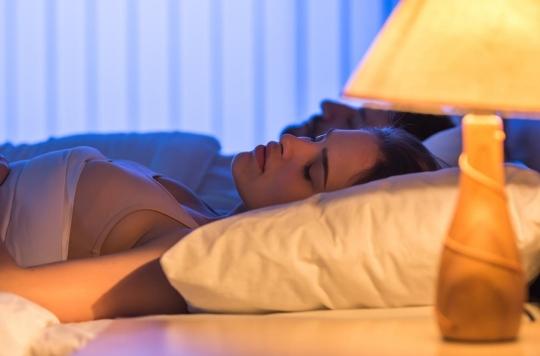Sleeping at night with the television or a lamp on could be a risk factor for weight gain and obesity in women.

If you’ve gotten into the habit of falling asleep with the TV, bedside lamp, or nightlight on, here’s a study that should interest you.
Conducted by American researchers attached to the National Institutes of Health and published in JAMA Internal Medicine, she claims that sleeping at night with an artificial light source can be the cause of weight gain in women. Fortunately, these harmful effects are reversible: turning off the lights at bedtime could thus reduce the risk of weight gain.
A large cohort study
To reach this conclusion, the researchers used data from a breast cancer risk factor questionnaire completed by 43,722 healthy women aged 35 to 74 with no medical history. The study questionnaire asked them in particular whether they slept without a light, with a small night light, a light outside the room, or with a light or a television on in the room.
The researchers also took measurements of the participants’ weight, height, waist circumference and hips as well as the body mass index (BMI) of the participants at the start of the study, which were followed for 5 years. This allowed them to study weight gain in women exposed to artificial light at night and in women who reported sleeping in the dark.
An average weight gain of 5 kg
The results are surprising: they show that weight gain varies according to the level of artificial light. For example, using a small nightlight at night is not associated with any weight gain, while women who slept with the television on were 17% more likely to have gained 5 kg in 5 years. In addition, women sleeping with a light source have “22% risk of being overweight and 33% risk of becoming obese”, says Dale Sandler, co-author of the study and researcher at the National Institute of Environmental Health. Sciences (NIEHS) in North Carolina.
“Humans are genetically adapted to a natural environment of sunlight during the day and darkness at night,” says study co-author and NIEHS researcher Chandra Jackson. “Exposure to artificial light at night can alter hormones and other biological processes in ways that increase the risk of diseases like obesity.”
According to her, light sources outside the room in which the participants sleep must also be taken into consideration, especially if they live in an urban environment. Indeed, street lamps, neon signs and other outdoor light sources can disrupt circadian rhythms by suppressing the production of melatonin, the sleep hormone.
Hence the need to take this factor into account in the fight against overweight and obesity. “An unhealthy, high-calorie diet and sedentary behaviors are the most commonly cited factors to explain the continued rise in obesity. This study underscores the importance of the factor of artificial light at night and gives women who sleep with the light or the television on a way to improve their health”, concludes Yong-Moon Park, who also participated in the work.

.
















